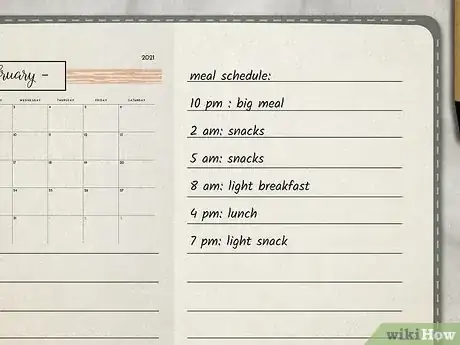This article was co-authored by wikiHow Staff. Our trained team of editors and researchers validate articles for accuracy and comprehensiveness. wikiHow's Content Management Team carefully monitors the work from our editorial staff to ensure that each article is backed by trusted research and meets our high quality standards.
There are 13 references cited in this article, which can be found at the bottom of the page.
This article has been viewed 104,871 times.
Learn more...
Working the night shift can be very difficult on your health and personal life, but there are ways to make it easier. Try to get at least six hours of sleep during the day and be as health conscious as possible. Opt for healthy meals and snacks, limit caffeine, and exercise regularly. Keep your social life happy by devoting time and energy to your relationships.
Steps
Getting Adequate Sleep During the Day
-
1Aim for at least six hours of sleep. It might be tempting to sleep less during the day with most the rest of the world awake and doing things, but it is important to adequate rest. Plan to sleep for at least six uninterrupted hours during the day. Getting less than six hours of sleep increases the risk of having low quality sleep and lower levels of serotonin, the “feel-good” hormone.
-
2Block out daylight. Since the human body is biologically designed to stay awake during sunlight hours, you must trick your body into thinking that it's dark out by blocking out sunlight. But blackout curtains from a department store, hardware store, or online to block the light out completely. Wear a sleep mask to further prevent distractions that might wake you up and ruin your sleep.[1]Advertisement
-
3Remove distractions. To prevent noise and other disruptions from waking you up, prevent as many possible distractions as you can before you go to sleep. Wear earplugs to block out noise and let family members or roommates know that you do not want to be disturbed. Turn off your phone or put it on silent to make sure it doesn't wake you up.[2]
Keeping Yourself Healthy
-
1Get regular medical check-ups. Working the night shift can increase your risk for a variety of medical problems, including diabetes, cancer, heart attacks, and obesity. Schedule regular check ups with your doctor to monitor your health and screen for illnesses. Ask your doctor for recommendations for any supplements or lifestyle changes that may help you stay healthy with a nighttime work schedule.[3]
-
2Eat healthy foods. Prepare your meals at home and bring them to work to avoid eating vending-machine snacks or other unhealthy foods. Opt for fruits, vegetables, whole grains, low fat dairy, and lean protein. Steer clear of foods that are sugary, high in fat, or spicy, as they can cause indigestion or sluggishness.[4]
-
3Time your meals properly. Aim to eat your main meal of the day in the evening before you go to work. Eating a large meal too soon before sleeping can cause heartburn, gas, or constipation. Eat smaller meals or snacks during your shift or afterwards.[5]
-
4Monitor your caffeine intake. Be mindful of how much caffeine you consume in a day to avoid adverse effects. Though it is tempting to drink coffee, tea, and caffeinated soda to stay alert, you should not consume more than 400 mg a day. Avoid drinking caffeine in the four hours before you intend to sleep, as it can adversely affect your ability to do so.[6]
- Note that 400 mg of caffeine is found in two or three small cups of regular coffee.
-
5Work out after your shifts. In addition to helping you stay fit, regular exercise will naturally increase your energy, positively impact your mood, and will also help you sleep better. Instead of going right to bed when you get home from your midnight shift, do some exercise. The morning is an ideal time to work out, and it will keep you allow you to sleep for longer before your next overnight shift. [7]
- Opt for high intensity cardio like cycling, which will provide an intensive workout and tire you out to ensure better rest afterwards.
-
6Make sure that you are getting enough vitamins. Working the midnight shift might mean that you are lacking essential vitamins, such as Vitamin D. Ask your doctor if vitamins and supplements (e.g., melatonin) are a good option for you. Purchase daily multivitamins over the counter at your local pharmacy for a good overall health boost.[8]
Maintaining a Social Life
-
1Socialize with other night shift workers. The best way to maintain a social life when you work the midnight shift is to befriend other people who have similar hours. Hang out with co-workers or friends that work nighttime jobs. Look for groups on social media (e.g., LinkedIn, Meetup) that connect night shift workers in your area.[9]
-
2Schedule time with loved ones. Make spending time with your family and friends a certainty by scheduling time with them ahead of time. Identify the overlapping free time that you have with others by making a detailed calendar, or by using a scheduling app that syncs up your calendar with theirs. Establishing when and how you will be seeing your significant other, family members, or friends will help prevent you from growing distant.[10]
- For instance, to work around your midnight shift, schedule a late night meal or early breakfast with friends.
-
3Check in with your loved ones whenever possible. Make time to call or text your loved ones as much as you can. Even if your communications are brief, keeping in touch regularly will convey the sense of caring and devotion that relationships need to survive. Ask how they are doing and let them know that you are thinking about them.[11]
- For example, send a friend a text like, “Hi! How are you feeling? I hope you finally got rid of that cold you had last week.”
Staying Alert at Work
-
1Turn on as many lights as possible. During your midnight shift, turn on as many lights as possible. Light sends signals to the brain telling it to be more alert. If the available light at your workplace isn't enough to keep you awake, purchase a small, portable light box that simulates natural light.[12]
- Light boxes can be purchased in department stores or online.
-
2Drink water and eat snacks through the night. Bring a large bottle of water with you to work to drink throughout the night. Getting dehydrated during your shift will leave you feeling drained and lethargic. Eating small, healthy snacks through out the night (e.g., baby carrots or crackers and cheese) will keep your blood sugar from dipping and help you maintain energy.[13]
-
3Move around as much as you can. To avoid dozing off during your shift, stand up and start an activity that will keep you moving. This may include work-related tasks such as sorting supplies or inventory, organizing papers or files, or cleaning your work area. If you get a break during your shift, take the opportunity to stretch your legs by going for a short walk, taking the stairs up and down several floors, or doing simple yoga stretches.[14]
References
- ↑ https://www.psycom.net/depression/night-shift-depression
- ↑ https://www.psycom.net/depression/night-shift-depression
- ↑ https://blogs.cdc.gov/niosh-science-blog/2021/04/27/nightshift-cancer/
- ↑ https://www.usa.edu/blog/how-to-work-night-shift-and-stay-healthy/
- ↑ https://www.dietitians.ca/your-health/nutrition-a-z/healthy-eating/10-nutrition-tips-for-shift-workers.aspx
- ↑ https://www.dietitians.ca/your-health/nutrition-a-z/healthy-eating/10-nutrition-tips-for-shift-workers.aspx
- ↑ http://www.shape.com/lifestyle/mind-and-body/8-energy-tips-night-shift-workers
- ↑ http://time.com/3556130/night-shift-brain-work-health/
- ↑ http://lifehacker.com/how-to-have-a-social-life-if-you-don-t-work-a-nine-to-f-1682714632
- ↑ http://lifehacker.com/shifts-manages-your-schedule-when-you-dont-work-a-nine-1681145037
- ↑ http://thecaregiverspace.org/5-ways-to-deal-with-a-friend-whos-always-busy/
- ↑ http://health.usnews.com/health-news/health-wellness/articles/2014/02/11/healthy-tips-for-night-shift-workers
- ↑ http://www.silvertracsoftware.com/extra/security-guard-tips-10-ways-to-stay-awake-during-the-graveyard-shift
- ↑ https://thenerdynurse.com/7-tips-to-stay-awake-on-night-shift/














































































Medical Disclaimer
The content of this article is not intended to be a substitute for professional medical advice, examination, diagnosis, or treatment. You should always contact your doctor or other qualified healthcare professional before starting, changing, or stopping any kind of health treatment.
Read More...